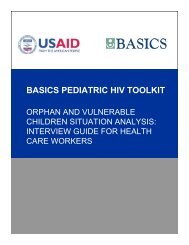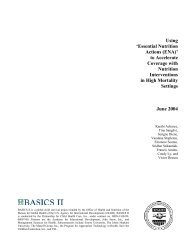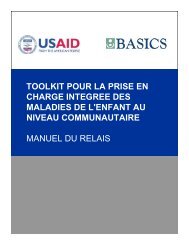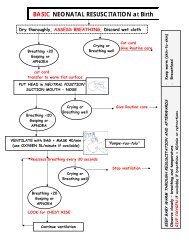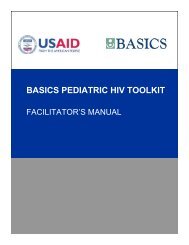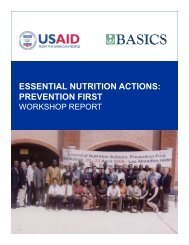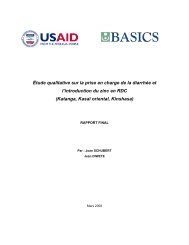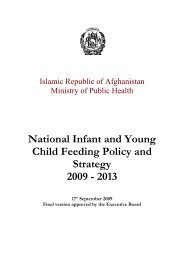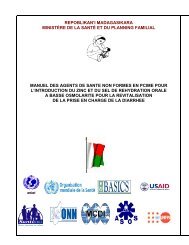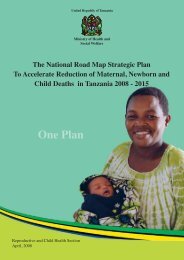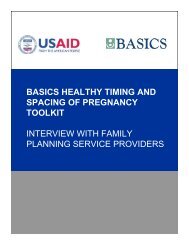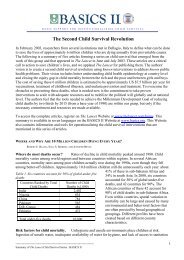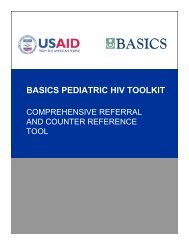Integrated Maternal and Newborn Care Basic Skills Course ...
Integrated Maternal and Newborn Care Basic Skills Course ...
Integrated Maternal and Newborn Care Basic Skills Course ...
Create successful ePaper yourself
Turn your PDF publications into a flip-book with our unique Google optimized e-Paper software.
• All pregnant women receive at least four focused (quality) antenatal visits.<br />
• Detection of risk factors should be modified to put the emphasis on educating the<br />
women, men, <strong>and</strong> family members about danger signs <strong>and</strong> the actions necessary to get<br />
timely access to maternal health services if the woman experiences a complication.<br />
• The so-called risk factors, instead of being considered as markers or indicators of<br />
complications, should be regarded as factors associated with complications, <strong>and</strong> their<br />
importance for each pregnancy <strong>and</strong> childbirth should be considered on a case-by-case<br />
basis.<br />
• The presence of risk factors implies a need for more careful monitoring, not because<br />
they are necessarily predictive of complications. For many of them (e.g., age), nothing<br />
can be done to alter the risk factor. However, additional care <strong>and</strong> watchfulness may<br />
prevent a complication from arising or enable its early detection <strong>and</strong> management.<br />
MATERNAL CONDITIONS AFFECTING FETAL AND NEWBORN SURVIVAL<br />
This section will discuss maternal conditions, pregnancy-related complications, <strong>and</strong> maternal<br />
infections that have an impact on fetal <strong>and</strong> newborn health <strong>and</strong> survival.<br />
Iron-deficiency Anemia<br />
Figure 3.1. Signs of iron-deficiency anemia<br />
An anemic pregnant woman has a high risk of getting<br />
ill (because of lowered resistance to infection), of<br />
having a low birth weight (LBW) infant with a birth<br />
weight of less than 2500 grams, of giving birth<br />
prematurely before 37 completed weeks of gestation,<br />
of suffering from postpartum hemorrhage <strong>and</strong> heart<br />
failure, <strong>and</strong> of dying. Many women are already anemic<br />
when they become pregnant; closely spaced<br />
pregnancies, malaria, hookworm, sickle cell anemia,<br />
<strong>and</strong> frequent <strong>and</strong> chronic infections are some of the<br />
causes of anemia.<br />
Iodine Deficiency<br />
Iodine needs increase greatly during pregnancy because iodine is essential for the development<br />
<strong>and</strong> maturation of the fetal nervous system. Iodine deficiency in the pregnant woman has been<br />
associated with: 1) in the fetus: abortion, stillbirth, retardation of cerebral development, <strong>and</strong><br />
congenital anomalies; 2) in the newborn: low birth weight, goiter, <strong>and</strong> neonatal hypothyroidism;<br />
<strong>and</strong> 3) in the adult: goiter <strong>and</strong> complications from goiters.<br />
Malnutrition<br />
<strong>Maternal</strong> undernutrition during pregnancy is associated with low birth weight. Low birth weight,<br />
in turn, has been shown to correlate with an increased incidence of the following: neonatal,<br />
infant, <strong>and</strong> child morbidity <strong>and</strong> mortality, small head circumference, mental retardation, cerebral<br />
palsy, learning problems/disabilities, visual <strong>and</strong> hearing defects, neurologic defects, <strong>and</strong> poor<br />
infant growth <strong>and</strong> development.<br />
30<br />
<strong>Integrated</strong> maternal <strong>and</strong> newborn care<br />
<strong>Basic</strong> skills course



